Finishing school - Mark Cavendish and the Giro d'Italia
Manxman returns after nine-year hiatus
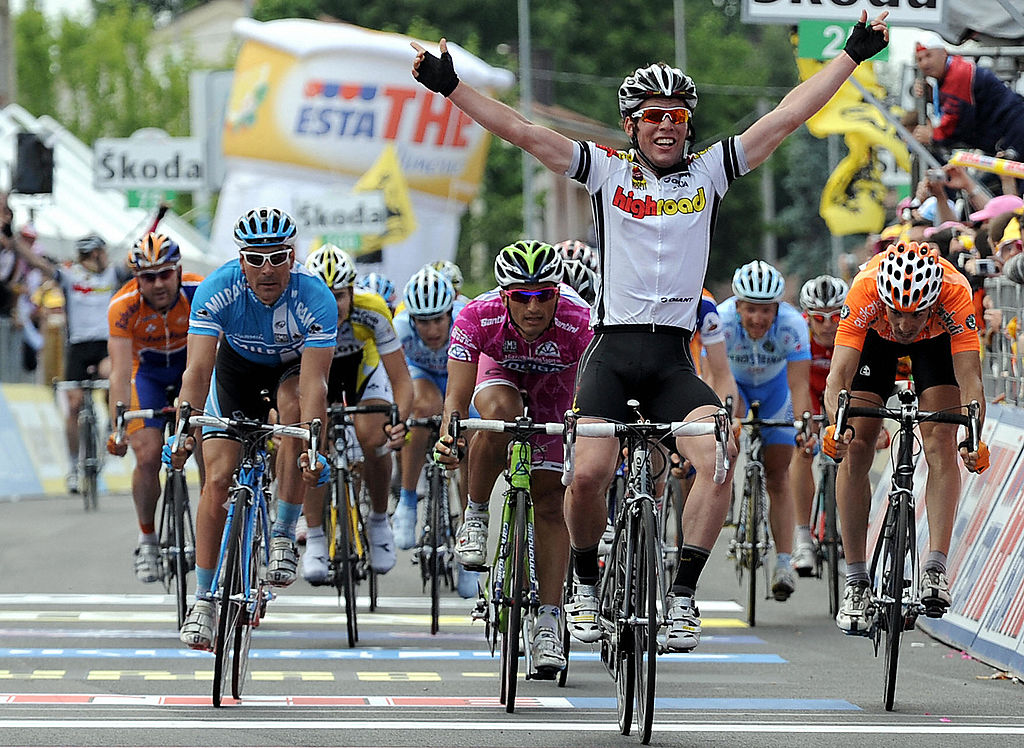
In 2022, Mark Cavendish returns to the Giro d’Italia after a nine-year hiatus. He sets out still hoping to earn selection for QuickStep-AlphaVinyl’s Tour squad, though it would be reductive to couch Cavendish’s Giro as a mere audition for July. He has history with this race, after all.
With fifteen stage wins and two stints in the maglia rosa, Cavendish made an impact every time he lined up in Italy, but after winning the points classification in 2013, he stayed away. At first he may have reasoned that going so deep in Italy was blunting his speed in July, and sponsor pressure to race the Tour of California was surely a factor too. Later, illness and form issues would remove the race from his horizon altogether.
Now, at the age of 36, Cavendish is finally back at the Giro. And if past experience is anything to go by, his Italian sojourn certainly won’t be dull.
2008: Lo sprinter gentiluomo
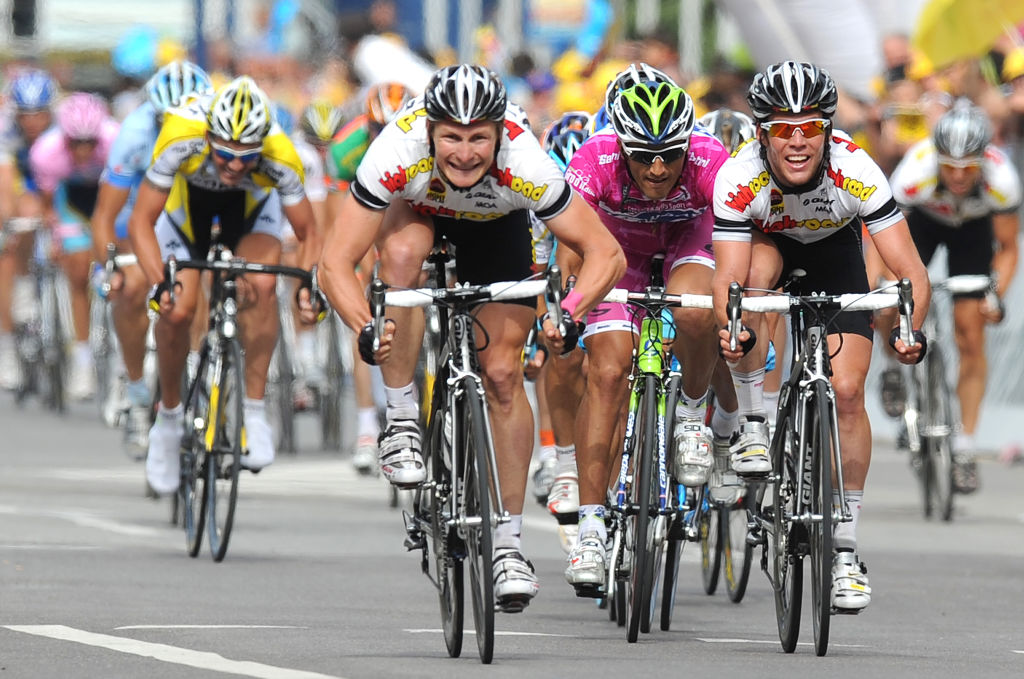
Catanzaro won’t feature as prominently as Copenhagen or the Champs-Élysées in any resume of Cavendish’s career, but the Calabrian capital proved to be a crucial waypoint in his maturation all the same. In May 2008 Cavendish was the coming man of world sprinting, but he was still in need of confirmation at the highest level.
After a mass crash in the final kilometre left just a dozen or so riders to contest the finish of stage 4, Cavendish still had Team High Road teammate Tony Martin for company, and the German towed up onto the wheel of Bennati. As the road curved gently to the right, Cavendish peeled off the Italian’s wheel and almost matter-of-factly claimed his first Grand Tour stage win.
Even before that victory, Cavendish’s reputation – good and bad – preceded him, as Il Corriere della Sera pointed out the following day: “Not long on the circuit, Mark isn’t too well liked. He’s been accused of not always being correct and maybe even of holding onto the team car a bit too much to catch back on – but yesterday’s win is clean and free of any shadows.”
Sprint opportunities were intermittent in a Giro where Riccard Riccò and Saunier Duval were minded to make life difficult at every opportunity for the seemingly undercooked Alberto Contador, hence Cavendish’s visible annoyance in San Vincenzo on stage 9, when he shook a fist in Tiziano Dall’Antonia’s direction for impeding him in the sprint. His frustration was directed inward when he took second behind Bennati in Carpi on stage 12 – "I went too late. A few metres after the line, I had it but that’s no use” – but he made amends the following afternoon in Cittadella.
Get The Leadout Newsletter
The latest race content, interviews, features, reviews and expert buying guides, direct to your inbox!
Bennati, yet again sprinting from the front, could have gently closed the door on Cavendish without incurring the attention of the commissaires, but he elected to hold his line, and the spoils fell to the Manxman. “I’d rather lose than win by making my rivals fall,” said Bennati. Cavendish appreciated the sentiment, even if he wasn’t entirely sure that he would have been quite so accommodating himself. “I have to thank him because he was correct and he didn’t put me into the barriers. I don’t know if I would have done the same,” he admitted.
And yet Cavendish had a streak of gallantry about him all the same. In the final week in Locarno, his Team High Road squad (set to be rebranded as Team Columbia later that season) dictated the terms in the sprint, with André Greipel leading Cavendish into the finishing straight. Rather than come around his teammate, Cavendish seemed to cede victory to him. “I owed André this for the job he did the other day. He deserved to win. He’s fast,” said Cavendish. “It wasn’t like I needed to come round him if he was going to win. It’s perfect.”
Greipel, for his part, saw things rather differently. “I think he tried to pass me,” he insisted. The incident was the first public fault line to develop in the internecine tension that simmered between them until Greipel’s departure two years later. But in the moment, Cavendish’s gesture won approval even from those who had expressed their reservations earlier in the race. “Cavendish: lo sprinter gentiluomo,” read the headline in Il Corriere della Sera: “Cavendish: the gentleman sprinter.”
2009: Cannonball
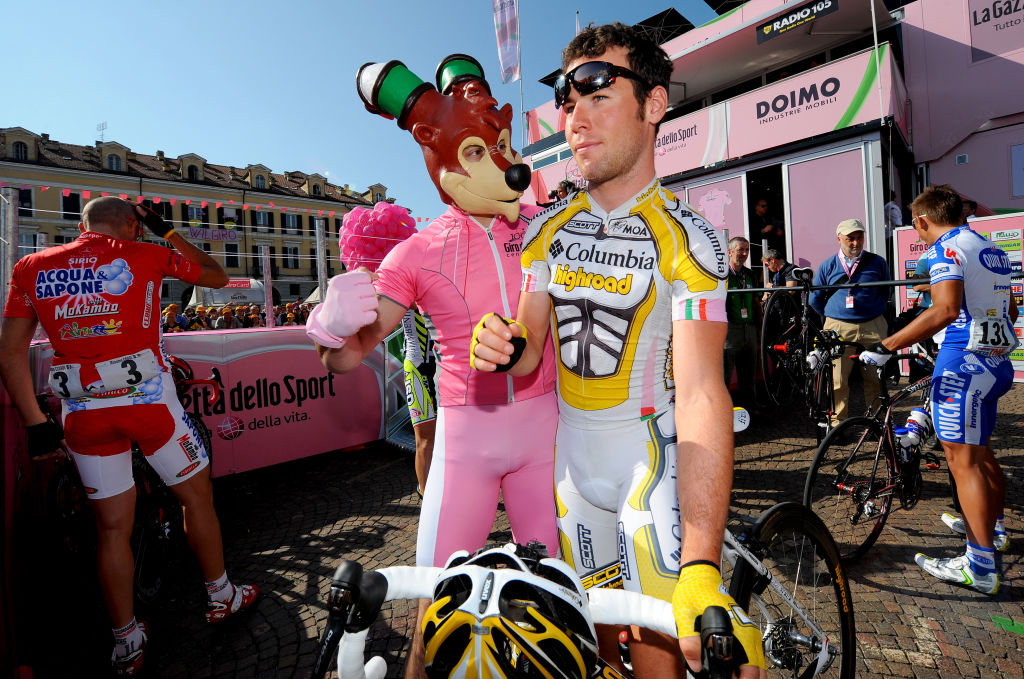
In the twelve months since his Giro debut, Cavendish had collected four stage wins at the Tour, a dramatic victory in Milan-San Remo and, in the Italian press at least, a new nickname. By the time he returned in 2009, it seemed that referring to Cavendish as ‘Cannonball’ had become de rigueur for newspaper reporters up and down the peninsula. The sobriquet endures in Italy to this day, even if it has travelled beyond the country’s borders about as willingly as Moser and Saronni did in the early 1980s.
Another Anglophone was exerting his gravitational pull on the media at the start in Venice, as Lance Armstrong included a Giro debut among the stops on his comeback tour. No matter, Cavendish still generated headlines in his pre-race press conference, when he took issue with Jonathan Vaughters for suggesting his Garmin squad’s season only began with the Giro’s opening day team time trial.
“They've said their season starts tomorrow. Their sponsor's paid money for the first six months of the year and I think that's highly disrespectful to those guys. It's May. Their season starts tomorrow, and I think it's going to end tomorrow night. I mean, come on...” said Cavendish.
The following afternoon, Team Columbia-Highroad (the sponsor's name having changed again slightly) duly pipped Garmin to victory on the Lido and Cavendish, first across the line, was in the maglia rosa. He clarified afterwards that his comments had been directed at Vaughters rather than the Garmin riders.
Those same Garmin riders, in any case, had greeted his outburst with eyerolls rather than annoyance. “We all know what Cav's like," David Millar said. "He's volatile. He can be saying something and he totally means it at the time, but when he's thought about it, 24 hours later, he can mean something completely different."
Cavendish’s tenure in the pink jersey was brief. Victory on stage 2 in Trieste seemed almost ineluctable but Cavendish made the mistake of believing that himself. He was, by own admission, “lazy” in the sprint, and he had to settle for second behind Alessandro Petacchi. “I left it too late to make the sprint easier for myself, but Alessandro got the jump on me,” said Cavendish. Or as one headline put it: “AleJet gives Cavendish a flying lesson.”
A day later Petacchi had the pink jersey, too, when Cavendish was held up by a late crash in prosecco country in Valdobbiadene. The unusually mountainous opening week of the centenary Giro meant that Cavendish had to wait until the race reached Milan on stage 9 for another opportunity to sprint. The gruppo, led by Danilo Di Luca and Armstrong, sought the neutralisation of the stage, citing the dangerous circuit, and the polemic would dominate the day’s headlines. The lone action was provided by Cavendish, who easily dispatched Allan Davis and Tyler Farrar in the sprint.
Two more wins would follow, first at Arenzano, where the ascent of the Turchino evoked still-fresh memories of Milan-San Remo, and then in Florence on stage 12, where Cavendish beat Petacchi by the banks of the Arno in the Parco delle Cascine. He would take his leave of the Giro the following day, his job done. “I want to try and stay for as long as possible, but I've got other objectives for the year," he said.
2011: David Copperfield
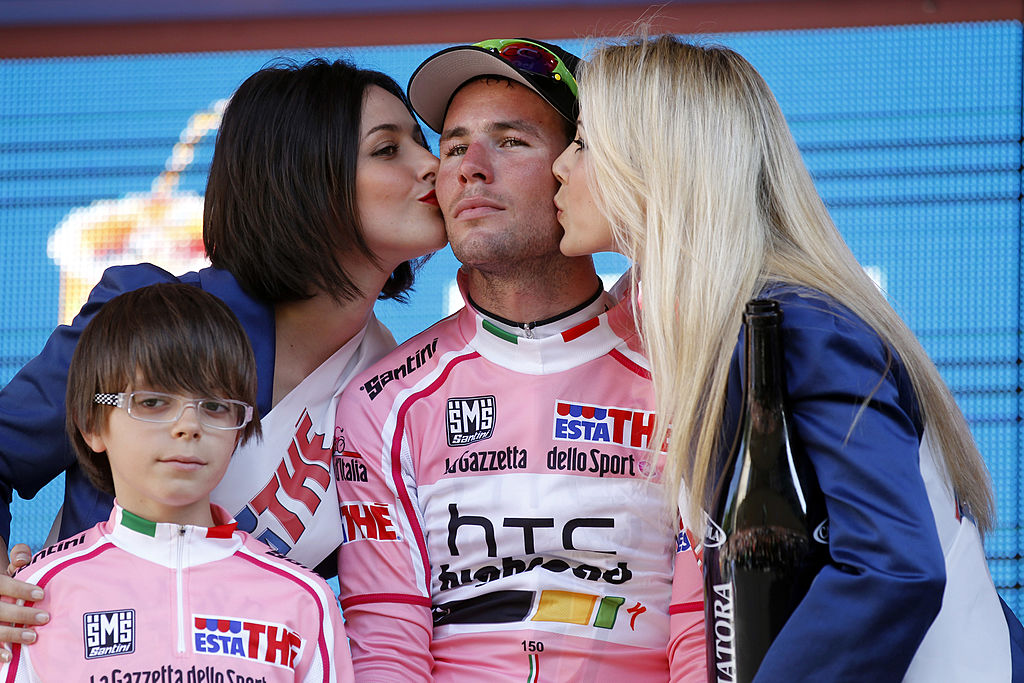
“Stay calm, stay calm,” HTC-Highroad press officer Kristy Scrymgeour repeated gently to Cavendish as she guided him through a scrum of photographers and towards the podium area in Parma after stage 2. Race director Angelo Zomegnan was waiting for him, and he placed a consoling hand on his shoulder, though Cavendish, his expression clenched like a fist, scarcely noticed it. Moments earlier, Petacchi had crossed the line in first place with his arms aloft, while Cavendish had a hand already raised in protest as he rolled by in second place.
The race jury didn’t agree with Cavendish’s assessment of the sprint, and Petacchi was quickly confirmed as stage winner. Highroad’s victory in the opening team time trial meant that Cavendish had nonetheless inherited the maglia rosa from his teammate Marco Pinotti, but that garment was a mere consolation prize considering the dearth of sprint opportunities in Zomegnan’s final and most fearsome Giro route.
By the time Cavendish sat down in the press room half an hour or so after the stage, he was calmer of mien, even if his annoyance was still palpable. Before a question could be asked, Cavendish reached for the microphone and delivered a soliloquy on the sprint, pausing intermittently to allow his words to be translated into Italian.
“Today in the sprint I felt that Alessandro moved from his line,” Cavendish said carefully. “In the past, every time I moved one centimetre from my line I was disqualified, but this isn’t Alessandro’s fault. This is the fault of the organisers or the commissaires or whoever is in charge at the time. For me I felt hard done by because for the same movement I would be disqualified.”
Slights, real or imagined, have always been a renewable energy source for Cavendish, and there were more to follow before he would get another sprint opportunity at this Giro. When the race tackled Mount Etna on stage 9, Cavendish finished just 25 seconds inside the time limit on a day that saw Robbie McEwen eliminated from the race. Cavendish’s fellow sprinter Fran Ventoso, however, claimed that the Manxman had taken a tow from his team car up the volcano. “It's shameful,” Ventoso said. “Everyone works hard to finish within the time limit and then someone holds on without the jury doing anything."
Cavendish’s response came two days later in Teramo, where he beat Ventoso into second place in the sprint and then rounded on the Spaniard in his post-stage press conference. "I challenge him to ride with me all day. If I piss, if I stop, if I crash, if I get a wheel change... I have the TV camera with me, I have the ice cream truck with me,” Cavendish said. “If it's possible for me to cheat, then I am doing a [David] Copperfield.”
There was certainly something of the illusionist about Cavendish’s sprint win. After HTC-Highroad effectively led out Petacchi in Parma, Cavendish looked to throw the Italian in Teramo by deliberately losing Mark Renshaw’s wheel with 2km to go. He then resurfaced on Petacchi’s wheel ahead of the flamme rouge before delivering a towering sprint.
It was, in hindsight, almost a dress rehearsal for the way he would drift off Geraint Thomas’ wheel in the finale of the Copenhagen Worlds in September. That race and the Tour were the pressing appointments of Cavendish’s 2011 campaign, but before taking his leave from the Giro, he notched up a second stage win in Ravenna.
2012: Rainbow warrior
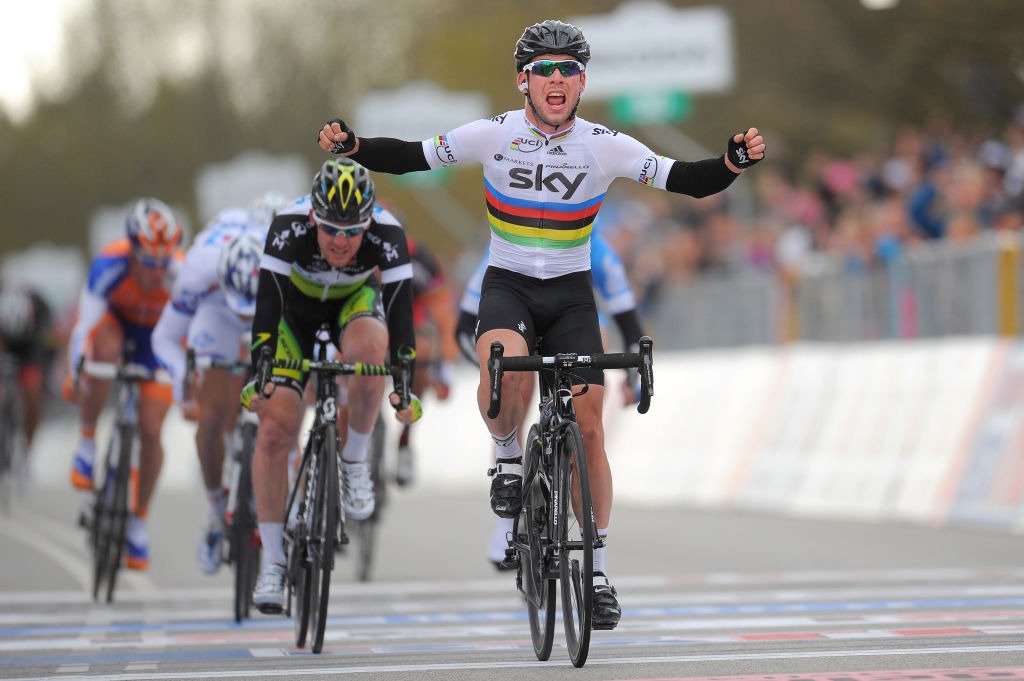
These days, the majority of pro cyclists’ Twitter accounts are little more than carefully curated exercises in shilling their sponsors’ wares. A change of ownership won’t change that tedious trend, but the landscape was slightly different a decade ago, when the site was at least a platform for the occasional unvarnished thought from the heart of the peloton.
It was Cavendish’s preferred mode of communication after stage 3 of that year’s Giro in Horsens, when he was brought down in a crash in the finishing straight after Roberto Ferrari swept across the road in front of him. Already the winner in Herning the previous day, Cavendish had swapped his rainbow jersey for the maglia rossa of points leader, but the final day of the Danish Grande Partenza would end in controversy. Cavendish hit the ground, Matt Goss won the stage and Ferrari took the rap.
“Ouch! Crashing at 75kph isn't nice! Nor is seeing Roberto Ferrari's manoeuvre. Should be ashamed to take out Pink, Red & World Champ jerseys," Cavendish tweeted afterwards.
"Apparently Roberto Ferrari has said to journalists, when asked about the incident, that he can't see what happens behind him & doesn't care. Is the team of Roberto Ferrari or the UCI going to do the right thing? Other riders, including myself, have been sent home for much less.”
Three days later, Cavendish would notch up his second stage victory when he beat Goss to the line in Fano, but his irritation with Ferrari hadn’t dissipated despite the Italian’s contrition. When Ferrari popped up to claim a surprise victory in Montecatini Terme on stage 11, Cavendish could scarcely hide his exasperation. “In the last kilometre when I was alongside Cavendish, he gave me a look and I understood what he meant,” said Ferrari.
Cavendish, back in the points lead after placing 4th, spelt it out on Processo alla Tappa after the stage. “He’s lucky he’s still in the race,” he said. “The commissaires would have kicked me out of the Giro if I’d done what he did.”
By then, Cavendish had other battles on his mind. In his lone season at Team Sky, he was perhaps aware that his prospects of taking green at the Tour were severely limited, hence his eagerness to carry the Giro’s red jersey to Milan. He consolidated his lead with his third win in Cervere on stage 13, but in those days, the Giro didn’t weigh the competition in the sprinters’ favour in quite the same way. With Joaquim Rodriguez making merry in the mountains, every sprint – every point – counted for Cavendish.
His last chance came in Vedelago in the final week, but he was upset by Andrea Guardini, who beat him into second place. Not for the first time, Cavendish finished a Giro stage with an arm raised in protest, even if he downplayed his ire afterwards. “I wasn't angry with him, I just don't like losing to anyone," said Cavendish, who instead directed his anger towards a familiar foe. “If I hadn't been knocked over by Roberto Ferrari at the end of stage 3, I'd be in a better position than I am now for the red jersey.”
So it proved. In the final reckoning in Milan, Cavendish lost the red jersey to Rodriguez by a solitary, maddening point.
2013: Centurion
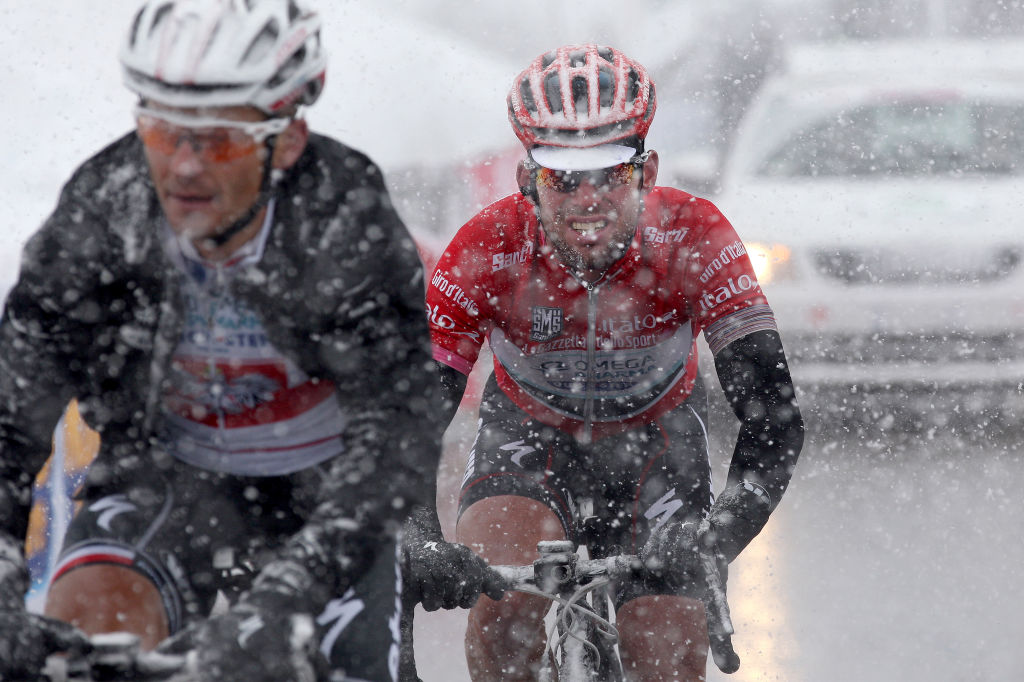
In Treviso’s Istituto Comprensivo Stefanini, Giro press officer Matteo Cavazzuti warned reporters that the press conference would be brief given the length of the transfer to the following day’s start in Busseto. Fortunately, the stage winner had made a career out of doing things quicker than most. After notching up his 100th professional win on stage 12, Cavendish made time to cram almost all his traditional tropes into what felt like an amalgam of press conferences past.
There was the usual dollop of praise for his QuickStep teammates, the almost forensic recall of the final kilometre, a sprinkling of introspection, and then, as an encore, a jab at the press. “You see the criticism the team’s come under this year. I think some people made some shit comments about the Saturday in Napoli when Gert [Steegmans] had a mechanical and they said that it didn’t work perfectly when in fact it was quite a perfect stage routine you know,” Cavendish said, and then muttered: “Cyclingnews…”
How dare they.
The victory in Treviso was Cavendish’s third of the Giro and it came just as Bradley Wiggins’ overall challenge ground to a halt on a day of driving rain. One way or another, their destinies always seemed to be entwined. Cavendish had already won on the opening stage in Naples – despite Steegmans’ mishap – and though he lost pink in the team time trial on Ischia the next day, he quickly set about building up an unassailable lead in the points competition.
There was unfinished business from the previous year, and Cavendish didn’t miss a beat. He would contest five bunch sprints on the 2013 Giro and win them all, including the final stage in Brescia. It all looked so easy. It all felt so routine. Cavendish quietly insisted that it was anything but.
“When I first started, winning was a bonus, you know?” he said that afternoon in Treviso. “Now anything but a win is a loss. That’s how things have changed.”
In the nine years since, everything has changed several times over and yet somehow everything has stayed the same.

Barry Ryan was Head of Features at Cyclingnews. He has covered professional cycling since 2010, reporting from the Tour de France, Giro d’Italia and events from Argentina to Japan. His writing has appeared in The Independent, Procycling and Cycling Plus. He is the author of The Ascent: Sean Kelly, Stephen Roche and the Rise of Irish Cycling’s Golden Generation, published by Gill Books.